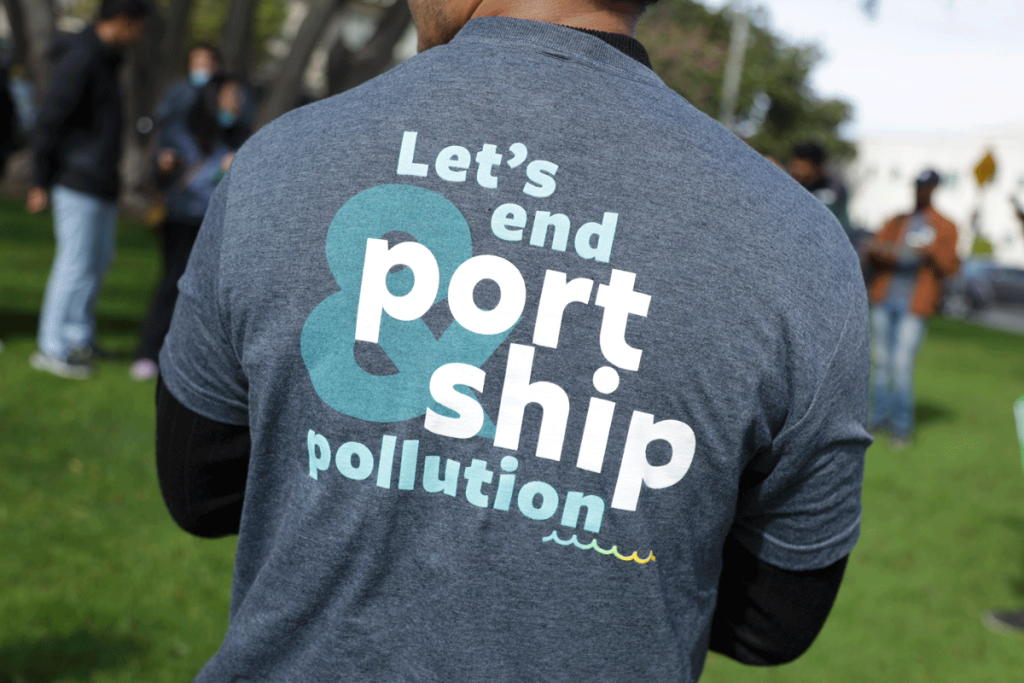
As part of its Port Master Plan Update, the Port of Long Beach (POLB) is currently considering land use modifications that would allow for the development of new fossil gas stations (also known as “bunkering”) at the port – a decision that would harm our community and exacerbate our climate crisis by increasing fossil fuel pollution and emissions.
The Port of Long Beach – comprising part of the largest port complex in the Western Hemisphere – proposed updates to its Port Master Plan that would expand permissibility for bunkering liquefied natural gas (LNG), a fossil fuel that is 85-95% methane. The port has also taken steps in other port planning processes to attempt to qualify LNG as a fuel that will help the port meet its goal of zero emissions.
If LNG bunkering facilities are built, the POLB would lock in harmful air quality pollution and climate-disrupting emissions for decades to come — and put the entire Long Beach community at risk.
Pacific Environment’s Ports for People campaign has launched a paid media campaign to challenge the fossil fuel industry’s greenwashing of LNG, to alert the public to the dangers of LNG, and to call on the Port of Long Beach to rescind its support for LNG. We launched a live petition calling on Long Beach leaders to reject LNG, and thus far received 440 signatures, including many students at Long Beach State University. Dawny’all Heydari, Climate Campaigner for Clean Ports Southern California for Pacific Environment, will be leading more than 60 canvassers over the next two weekends — on February 18 and 25 — to knock on up to 5,000 doors in Long Beach to educate and encourage citizens to get involved and to push back on LNG at the ports. (Photos to be available on February 21).
“Allowing fossil gas LNG bunkering at our ports will inflict irreparable harm onto our communities, our health, and our climate,” said Dawny’all Heydari, Climate Campaigner for Clean Ports Southern California for Pacific Environment. “We are urging Long Beach Mayor Rex Richardson, Harbor Commission President Sharon Weissman, and Port Executive Director Mario Cordero to reject LNG at our ports and to focus on transitioning to a truly 100% zero-emission future for the port – before it’s too late. The city and the port have an urgent imperative to prioritize the health and long-term sustainability of our community and communities neighboring the Port of Long Beach.”
From extraction to consumption, LNG emits methane, a super-disrupting greenhouse gas that is up to 86 times more potent in its climate-warming potential than carbon dioxide on a shorter timescale – meaning more global warming, faster.
In addition to warming our climate, LNG poses risks to public health and safety. As a fossil fuel, LNG causes air quality pollution that contributes to increased rates of childhood asthma, increased respiratory emergency room visits, and premature death. Globally, shipping emissions were projected to cause 265,000 premature deaths annually (2020). LNG facilities also expose the community to potential explosions, fires, and natural gas leaks. In June 2022, the Freeport LNG export facility in Texas suffered an LNG blast that caused a 450-foot fireball. Freeport LNG has been the subject of 11 Pipeline and Hazardous Materials Safety Administration (PHMSA) cases in the last seven years. PHMSA sought a $2.2 million fine against Cheniere Energy Inc., another Gulf Coast LNG operator after a leak occurred at its Sabine Pass facility.
In 2021, the United States and the European Union announced a Global Methane Pledge to take voluntary actions to contribute to a collective effort to reduce global methane emissions at least 30% from 2020 levels by 2030, which could eliminate over 0.2˚C warming by 2050. As a U.S. city with a major port, Long Beach must take the steps necessary to support our national commitment to this pledge. Allowing LNG bunkering at the port is a step in the wrong direction and will imperil our ability to reduce methane emissions globally.








